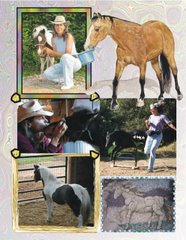For the last fifteen or so years the word respect has been over-used in the context of animal training. I keep trying to find ways to examine the assumptions about the word respect.
Now let's look at the word respect. From a human standpoint we like to think of respect as an attitude or frame of mind, but this is where we get into trouble, even with humans. For humans respect is individualized with many differing rules. Finding out each person's idea of respect is almost like learning from one of those buried hot wire fences for dogs. you never know when you're gonna cross the line and get zapped, and it takes a lot of trial and error to find out where the boundaries are!
I'd like to promote a change in how we think of respect. We could just as easily say respect is a series of behaviors defined by the person who wants respect. So for me, respect might mean showing up on time at an appointment. To someone else it might mean saying "Please" and "Thank you." By actually defining and verbalizing each person's expectations of respect, we make it clearer for those around us and we can avoid the unpleasant "shock" of crossing those invisible respect barriers.
So back to our horses. If respect is this complicated for people, how are the horses going to understand the concept? Let's bail on the word respect; face it, horses are not advanced enough to understand the psychological, sociological and philosophically advanced concept of respect. What we need for our horses is definable behaviors, something they CAN DO. For example, "Stay two feet away from me and then I will walk towards you to make contact," or "Back up when I come into through the gate to feed you dinner."
These are things that can be trained and they're easy for the horse to understand. Train these behaviors specifically and let go of all the baggage that comes to mind when we think of the word respect. By letting go we won't get frustrated or angry because the horse is not "respecting us" or following some concept he doesn't understand anyway.
Get real, define the behaviors and train your horse. You'll both be happier.
Subscribe to:
Post Comments (Atom)




No comments:
Post a Comment